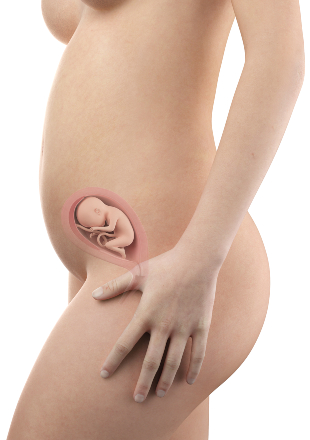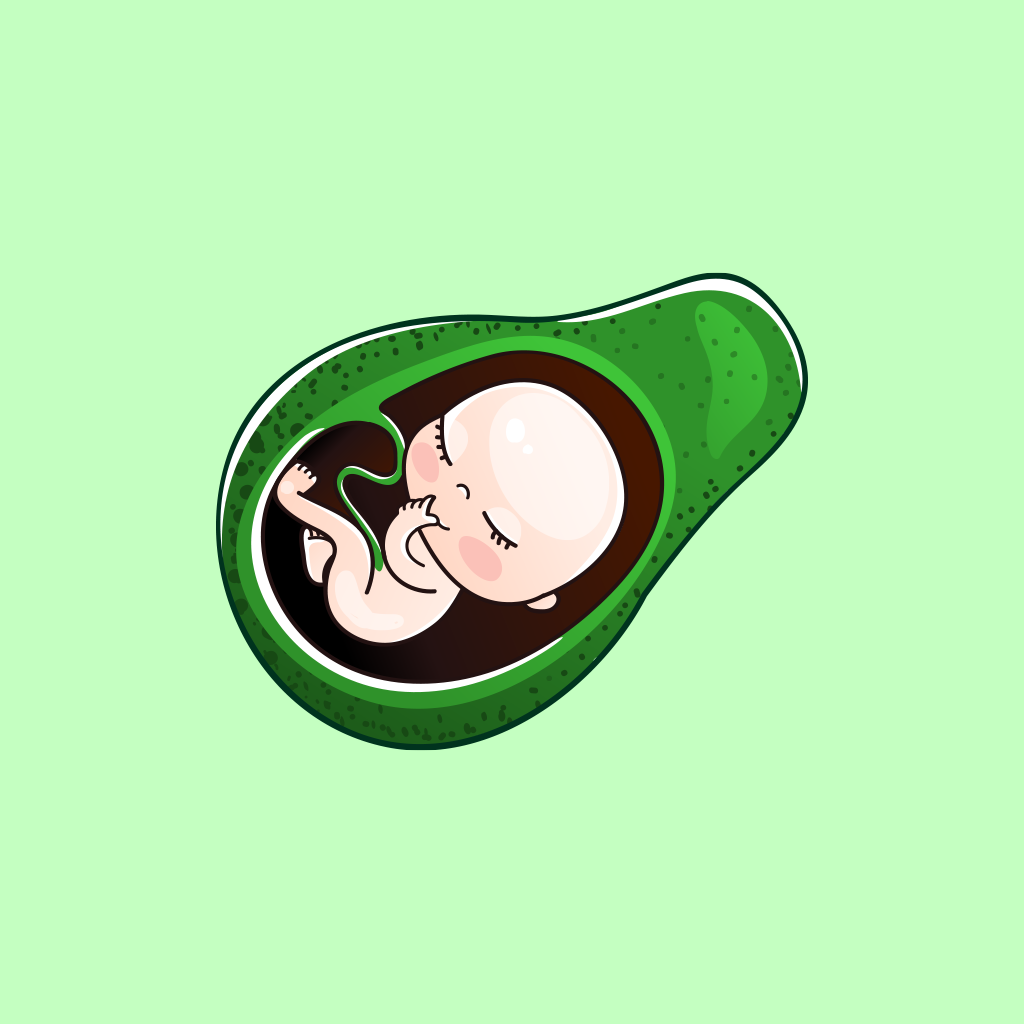Welcome to Week 17! You’re well into your second trimester, and many moms-to-be find themselves settling into the rhythm of pregnancy by now. Some early discomforts may have eased, making this stage a little easier—and possibly more exciting—as you notice new changes in both your body and your baby.
At 17 weeks, your little one is growing steadily. Imagine something roughly the size of a pear—that’s about how big your baby is now! Bones are getting stronger, and those tiny features are becoming more defined. Inside your belly, your baby is practicing movements, even if you’re not feeling strong kicks just yet. Some moms might start to notice gentle flutters or bubbles, a first introduction to the growing life inside you.

You may begin noticing other new changes, too. For example, your belly might be looking rounder, your appetite could be increasing, and you might feel little aches in your lower abdomen. This is often due to your uterus stretching and making room for your growing baby. It’s all part of the process, but if you experience sharp pains, bleeding, or anything that worries you, don’t ever hesitate to check in with your doctor—your peace of mind matters.
Week 17 is also a good time to focus on your own wellness. Staying active can help ease aches and boost your energy. Gentle activities, like walking or prenatal yoga, are excellent choices. Eating a balanced mix of foods—fruits, vegetables, lean proteins, and whole grains—can also help you and your baby thrive.
- Listen to your body and take breaks when you need them.
- Stay hydrated by drinking enough water throughout the day.
- It’s okay to ask for help if you’re feeling tired or overwhelmed. Lean on your support system.
- Look forward to upcoming prenatal visits—your care team is there to support you every step of the way.
Remember, every pregnancy is unique. You’re doing something amazing, and it’s perfectly normal to feel a mix of joy, concern, and curiosity in this stage. Celebrate your progress and take gentle care of yourself and your growing baby.
Your Baby’s Development This Week
This week marks a special point in your pregnancy journey! At 17 weeks, your baby is getting bigger, stronger, and even more active. Let’s explore some exciting changes happening inside your belly right now.
First, let’s talk about size. Your little one is now about the length of a large onion—just over 5 inches long and weighing close to 5 to 6 ounces. Even though your baby is still small, they’re putting on more weight as they grow, thanks to the start of fat deposits under their skin. This early baby fat will help them keep warm after birth and supports healthy growth.
Your baby’s physical features are becoming more defined too. You might be delighted to learn your baby’s fingerprints are now fully formed—already making them one-of-a-kind! Hair is beginning to sprout on the head, as well as fine lashes and eyebrows. Underneath that developing skin, which is still quite thin and transparent, tiny fingernails and toenails are growing in as well.
There’s also something truly amazing happening on the inside: your baby’s bones are getting stronger every day. The flexible cartilage that made up their skeleton is gradually hardening into bone. Meanwhile, the digestive system is starting to work, getting in some early practice by moving amniotic fluid through the intestines. The urinary system is up and running, with your baby swallowing amniotic fluid and then peeing it out. And, deep in those developing organs, the pancreas has now started to produce small amounts of insulin—a key hormone for regulating blood sugar.
Your baby’s little heart is a powerhouse, pumping dozens of quarts of blood each day. Strong circulation is helping all those rapidly growing tissues and organs start working together. Even the lungs are busy now; while your baby won’t need them for breathing air just yet, they’re starting to move amniotic fluid in and out, prepping for that first breath after birth.
- Movements you might notice: If this isn’t your first baby, you may start to feel quick flutters. These early kicks, twists, and turns can feel like butterflies or gentle bubbles in your belly. If you haven’t noticed them yet, don’t worry; every woman feels these first movements at different times.
- Protective coating: Your baby’s skin now has the beginnings of a waxy layer called vernix caseosa. This thin covering protects their sensitive skin from the amniotic fluid and will stick around until closer to delivery.
- Interactive skills: With stronger muscles, your baby is practicing new moves! Bringing hands up to their mouth, making little fists, and even improving their grip—these small but mighty steps are preparing them for life outside your womb.
- Sensory growth: Your baby’s mouth is opening and closing, and their eyes can now move around, even though the eyelids are still shut. The sucking reflex is developing, which is perfect practice for feeding.
Remember, your baby is growing and changing every single day, even though you can’t see all the details from the outside. Your careful choices—taking vitamins, eating well, and seeing your doctor—are giving your baby the best start possible. Enjoy this incredible stage, and know you’re doing a wonderful job nurturing your little one!
Changes in the Mother’s Body
At 17 weeks pregnant, you may notice that your body is working hard to nurture the tiny life growing inside you. Even if this isn’t your first pregnancy, many changes can still feel new and surprising. Here are some of the most common shifts you might experience around now, plus what they mean for you and your growing baby.
- Breasts are preparing for baby: Around this time, your breasts could feel fuller, heavier, or more sensitive than before. You might notice that your bras feel tighter or that your cup size has gone up. Blue veins may become more visible under your skin, a sign that extra blood is flowing to help produce milk when your baby arrives.
- More energy on the horizon: The fatigue and nausea of early pregnancy often start easing up by now. Many women find they have more energy for their daily routines — and even for light exercise or gentle walks. Take advantage of this boost, but listen to your body and rest when you need it.
- Growing belly and shifting posture: By week 17, your bump is probably showing more, and you may notice your lower back starting to arch a bit as your center of gravity shifts. Some women experience mild backaches or a sense of heaviness in their lower abdomen. Consider investing in comfortable, supportive shoes and practicing gentle stretches for relief.
- Changes in skin and hair: Pregnancy hormones can bring modifications to your skin and hair. You could notice that your hair feels thicker or shinier, while some women develop a dark line down the middle of their belly, called the linea nigra. Some mums see patches of darker skin on their face or body (known as melasma). Wearing a hat and sunscreen outdoors can help protect sensitive skin.
- More noticeable movement: One exciting milestone is starting to feel gentle flutters or bubbles in your belly — a sign that your baby is moving! These first faint movements, “quickening,” might be more familiar if you’ve been pregnant before, but for many first-timers, it can take a little longer to notice.
- Boost in blood flow: Your blood volume is steadily increasing to support your baby’s needs. This can sometimes cause mild swelling in your hands or feet, as well as a healthy “glow” to your cheeks. Drinking plenty of water and taking breaks to elevate your feet can help manage swelling.
- Body temperature and sweat: With more blood circulating, you may feel warmer than usual, or find you’re sweating more. Lightweight, breathable clothing and staying hydrated can help you stay comfortable.
It’s natural to have a mix of excitement and questions as your body changes. Remember, each pregnancy is unique. If something feels out of the ordinary or causes discomfort, don’t hesitate to contact your healthcare provider. They’re there to support you every step of the way!
What Medical Checkups or Tests Should You Have at 17 Weeks Pregnant?
At 17 weeks, you’re moving deeper into your second trimester, and your prenatal visits play an important role in making sure you and your baby are both healthy. Even if you’re feeling well, these checkups help your care team track your baby’s growth and watch for any potential problems early on, so you can feel confident about your pregnancy journey.
Here’s what you can typically expect at this stage:
- Routine Prenatal Appointment: Most women have a regular prenatal visit every 4 weeks during this part of pregnancy. During this appointment, your healthcare provider will check your weight and blood pressure, answer your questions, and talk to you about any new or bothersome symptoms.
- Listening to Baby’s Heartbeat: Using a small device called a Doppler, your provider will listen to your baby’s heartbeat. This is often one of the highlights for expectant parents and is a quick way to make sure everything sounds as it should.
- Measuring Your Belly: While your baby bump might just be showing, your provider may begin measuring your abdomen to track your baby’s growth. This measurement, called the fundal height, helps make sure your baby is growing on track.
- Urine Test: At most visits, you’ll be asked for a urine sample. This test checks for things like protein and sugar, which can give clues about your kidney health and screen for early signs of gestational diabetes or preeclampsia.
- Blood Tests (If Needed): If certain routine blood tests weren’t done earlier, they may be completed now. These can include checks for anemia, blood type, or other important markers to keep you and your baby healthy.
- Genetic Screenings: Some parents choose additional genetic screens or blood tests between 15 and 20 weeks to check for chromosomal conditions. If you’re interested, talk with your provider about what options are available and whether they’re right for you.
- Ultrasound Planning: While the detailed anatomy scan (sometimes called the 20-week scan) typically happens a bit later, your provider may start discussing plans for scheduling this important ultrasound. It’s a good opportunity to ask any questions about what this scan will involve and what it can show.
- Managing Ongoing Concerns: If you have symptoms like unusual pain, heavy bleeding, or concerns about movement, don’t wait for your next scheduled appointment—contact your healthcare provider right away for guidance.
Every pregnancy is unique, so your checkups might include different steps depending on your health and your baby’s needs. If you’ve had any special tests earlier (like an amniocentesis) your care team will help you understand next steps, including whether any follow-up procedures might be recommended.
This is also a wonderful time to bring up questions, big or small, with your provider—whether they’re about body changes, sleep positions, nutrition, or emotional ups and downs. Your peace of mind matters, so don’t hesitate to ask what’s on your mind. These appointments are for you, too!
Nutritional Tips and Physical Exercise
At 17 weeks pregnant, you and your baby are both growing and changing every day. The right nutrition and safe, gentle movement can help you feel your best and support your baby’s healthy development.
Here are some helpful tips to guide you this week:
- Eat Small, Balanced Meals Often: As your baby grows, you might find it easier to have smaller meals more often instead of three big ones. Focus on including fruits, vegetables, whole grains, lean meats or plant-based proteins, and healthy fats at each meal or snack.
- Add Iron-Rich Foods: Your body needs more iron now to help your baby make new blood. Enjoy foods like spinach, beans, red meat, lentils, or fortified cereals. Pair them with vitamin C-rich foods like orange slices or strawberries to help your body absorb the iron better.
- Support Bone Health: Your baby’s bones are getting stronger, so calcium is still very important. Add low-fat dairy, fortified plant milks, tofu, almonds, or dark leafy greens to your diet. Ask your provider if you need extra calcium or vitamin D.
- Stay Hydrated: Drink plenty of water throughout the day—aim for at least 8-10 cups. Carry a water bottle and sip often. Staying well-hydrated supports increased blood flow and helps prevent constipation, which is common in pregnancy.
- Listen to Your Body: If you find certain foods don’t sit well with you or make you feel queasy, that’s okay. Try new recipes with gentle flavors, or bland snacks like toast, bananas, or rice when needed.
- Enjoy Healthy Snacks: Keeping healthy snacks on hand—like yogurt with berries, carrot sticks with hummus, or a small handful of nuts—can help manage hunger between meals and give you a steady supply of energy.
- Keep Moving Safely: Most moms can benefit from regular, gentle exercise. Walking, prenatal yoga, swimming, or even light stretching can ease aches, boost your mood, and help you sleep better. If you’ve been active before pregnancy, keep it up, just at a comfortable pace. If you’re new to exercise, short daily walks are a great start.
- Listen to Your Limits: Your growing belly may mean some things feel different now. It’s important not to overdo it. If something hurts or feels off, stop and check in with your doctor or midwife before continuing.
- Strengthen Your Back and Core: Simple movements like pelvic tilts can support your posture and help reduce back pain as your baby grows. Look for a prenatal fitness class either in person or online for expert guidance.
- Avoid High-Risk Activities: Skip any activities where you might fall or get hit in the belly—things like horseback riding, contact sports, or exercises with lots of jumping. Stick with options you feel confident and comfortable doing.
- Include Your Partner or a Friend: Going for a walk or stretching together can be a fun way to stay connected and get the encouragement you need.
If you have special dietary needs or any health concerns, reach out to your healthcare provider or a registered dietitian. Every pregnancy is different, and it’s important to find what works best for you. Remember, caring for yourself helps your growing baby too!
Weekly Checklist
This week, your baby is growing fast and your body is changing in wonderful ways. Here are some gentle reminders and fresh ideas to help you enjoy and manage Week 17 of pregnancy:
- Check in on your baby’s movements: Start paying attention to any tiny flutters or gentle kicks—many moms begin to notice these little signs of life now, especially if you’ve been pregnant before. Don’t worry if you haven’t felt anything yet; every pregnancy is unique!
- Refresh your bra collection: Your breasts may keep growing during this trimester. Try on your current bras and consider picking up a couple of comfortable, supportive options in a larger size to help prevent back and shoulder discomfort.
- Stay cool and comfortable: Hot flashes and a bit more sweating are normal thanks to increased blood flow. Wear loose, breathable clothing, and keep a water bottle handy to stay hydrated throughout the day.
- Review and update your sleep setup: Lying on your back or stomach is beginning to feel awkward. Introduce a pillow between your knees or invest in a pregnancy pillow to help you settle comfortably on your side at night.
- Feed your body well: With your baby’s bones hardening and fat starting to form, calcium and healthy fats are important. Include foods like yogurt, leafy greens, and avocados in your meals.
- Track mild symptoms: Notice any extra discharge, new veins, or mild aches? These are quite normal. Make a note of anything unusual so you can discuss it at your next appointment.
- Create moments of calm: Take a few minutes each day to relax and bond with your baby. Gentle music, a warm (not hot) bath, or simply resting with your hands on your belly can be soothing.
- Start a keepsake journal: Now is a lovely time to jot down your thoughts, feelings, or any vivid dreams. You might also want to document those first wiggles or pick out ideas for your baby’s future room.
- Revisit prenatal appointments: Confirm your upcoming check-in with your healthcare provider. Write down any new questions about your health, diet, or things you’re curious about regarding your baby’s progress.
- Keep moving: Simple daily walks or a gentle exercise routine (approved by your doctor) can boost your mood and help ease any backaches or stiffness that may be starting.
Remember, there’s no “perfect” way to experience pregnancy—listen to your body, enjoy these new milestones, and reach out to your care team with any worries, no matter how small.
When to Call Your Doctor
During week 17, you’re probably feeling more like yourself, but it’s still important to know when something needs your doctor’s attention. Trust your instincts—if something feels off, you never have to hesitate to call. Here are signs you should reach out to your healthcare provider right away:
- Heavy or persistent vaginal bleeding: A few small spots can be common, but a flow similar to a period or bleeding that doesn’t stop warrants a call.
- Strong cramps or lower belly pain that won’t go away: Some stretching is normal as your uterus grows, but any pain that’s severe or doesn’t improve with rest needs to be checked.
- Sudden swelling in your face, hands, or around your eyes: Mild swelling in feet and ankles is expected, but sudden puffiness elsewhere may be a sign of high blood pressure.
- Severe headaches that don’t go away, even with rest or hydration: While occasional mild headaches can happen, ongoing or intense headaches should be discussed.
- Vision changes: Blurred vision, seeing spots, flashes, or sudden loss of vision are reasons to call right away.
- Leaking fluid from your vagina: A constant trickle or gush (not normal discharge) could mean your water has broken early.
- Burning or pain when you pee, or needing to go all the time with discomfort: These could be signs of a urinary tract infection.
- Fever over 100.4°F (38°C): If you develop a high temperature, especially with chills or body aches, check in with your doctor.
- Sudden or severe shortness of breath, chest pain, or trouble breathing: These symptoms should never be ignored.
- No movement from baby (if you were feeling movement before): If you start feeling your baby move at this stage and then notice a sudden stop, mention it to your provider.
- Feelings of sadness, anxiety, or hopelessness that last more than a few days: Your mental well-being matters, too. Let your provider know if you’re struggling emotionally.
Remember, every pregnancy is unique and it’s always okay to call for reassurance or with any questions—no concern is ever too small. Your doctor is there to support you and your growing baby every step of the way.
Preparations for Baby
As you settle into week 17, it’s a wonderful time to start thinking about how you can welcome your baby into a cozy, organized space while also looking after your own peace of mind. Here are some gentle steps you can take to feel more ready for the months ahead:
- Start gathering baby essentials slowly. No need to rush out and buy everything at once. Make a simple list—things like a safe crib, a few soft swaddles, and onesies in newborn and 0-3 month sizes. This can help spread out expenses and keep shopping manageable.
- Create a calm corner for yourself. If you have a spot where you can relax or read up on newborn care, it makes learning and reflecting about motherhood more enjoyable. Keep books, magazines, or a journal nearby to jot down your questions or thoughts for future visits to your doctor.
- Discuss your hopes with your partner or support person. Share ideas about parenting, household tasks, and who might help you after baby arrives. This is a good time to talk about support during late pregnancy and the early weeks of your baby’s life.
- Test-drive relaxation methods. Practice gentle breathing or listen to soothing music in the evenings. Even five minutes a day can help bring calm, making it easier to rest and sleep as your body changes.
- Start a memory keepsake. Many moms enjoy keeping a simple photo log or a digital diary of their pregnancy. Take a bump picture or write a note to your baby—you’ll treasure these memories later, and it can become a lovely ritual.
- Preview your home with a “baby’s-eye view.” You don’t need to remodel yet, but walk through and notice potential hazards or places you might want to organize. Babyproofing can wait, but starting early helps avoid last-minute stress.
- Reach out to your community. Ask friends or family about their favorite baby gear or parenting advice. Sometimes, hearing real-life experiences can bring new ideas and a sense of connectedness.
Remember, there’s no perfect way to prepare. Allow yourself to enjoy small steps—you’re doing a wonderful job getting ready to meet your little one. Every bit of thoughtful planning now can help you feel more settled and confident as your due date gets closer.
Citations and References
- Mayo Clinic – Details normal fetal development and maternal changes at 17 weeks of pregnancy. Visit Source
- The American College of Obstetricians and Gynecologists (ACOG) – Outlines recommended prenatal care schedules and common symptoms during the second trimester. Visit Source
- Cleveland Clinic – Describes fetal growth, major organ system development, and common maternal symptoms at this stage. Visit Source
- National Institutes of Health (NIH) – MedlinePlus – Offers a week-by-week pregnancy overview, including fetal milestones and maternal changes. Visit Source
- Centers for Disease Control and Prevention (CDC) – Provides guidelines on prenatal nutrition, vitamins, and general pregnancy health. Visit Source
- World Health Organization (WHO) – Shares general prenatal care recommendations and best practices for healthy pregnancies. Visit Source










